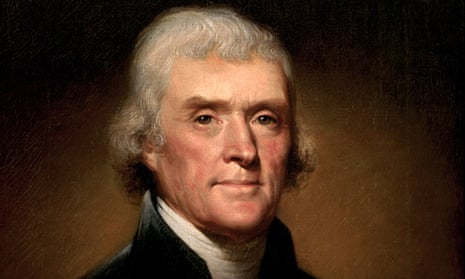The board that oversees advanced placement courses for US high school students has revised its US history standards to include a section on “American exceptionalism” after significant backlash from culture conservatives who said the exam wasn’t patriotic enough.
The advanced placement (AP) history framework, revised in 2014, triggered a nationwide debate over how American high schoolers should learn about their nation’s history, pitting conservatives who found the curriculum “anti-American” against teachers and students who rejected the changes as “revisionism”.
In response, the new framework explicitly introduces the concept of “American exceptionalism”, and highlights achievements of US history through this lens. It also includes direct references to the names and roles of the nation’s founding fathers, including George Washington, Thomas Jefferson and Benjamin Franklin – a flashpoint in the debate. It does, however, maintain roughly the same number of references to slavery as the 2o14 exam.
“Every statement in the 2015 edition has been examined with great care based on the historical record and the principled feedback the College Board received,” the College Board said in a statement posted on their website on Thursday. “The result is a clearer and more balanced approach to the teaching of American history that remains faithful to the requirements that colleges and universities set for academic credit.”
AP courses offer high-achieving high school students the opportunity to take university-level classes. At the end of the school year, students take the AP exam, earning a grade that many universities accept as college credit.
The College Board began working on a revised framework for the AP History course in 2006, after AP teachers “expressed frustration that the previous course did not provide sufficient time to immerse students in the major ideas, events, people, and documents of US history, and that they were instead required to race through topics”. The redesign, intended to address those concerns, was introduced and used for the first time last fall.
The AP exam had sparked heated political debates in Georgia, North Carolina and South Carolina. In Texas, the Republican-dominated state Education Agency pushed the College Board to rewrite the curriculum. And in February, the Oklahoma state legislature contemplated a bill that would effectively ban the course from being taught in public high schools.
Last year, the Republican National Committee passed a resolution slamming the College Board for pushing a “consistently negative view of American history” and calling on the company to delay the implementation of its revised framework. Ben Carson, a retired neurosurgeon who is running for the Republican nomination, warned during a speech at the conservative Center for Security Policy: “I think most people, when they finish that course, they’d be ready to go sign up for Isis.”
There were those, too, who rose to its defense. In Jefferson County, Colorado, students and educators staged a series of protests and walkouts after a school board ordered the course to promote “patriotism” and the “benefits of free enterprise” while discouraging “civil disorder, social strife, or disregard of the law”.
A recurring complaint and a sticking point of the debate was that the framework didn’t explicitly name historical figures such as George Washington and Thomas Jefferson.
In an open letter, committee-members who helped design the framework, called criticism of the exam “uninformed”, and argued that the names of historical figures were not included only because teachers did not need such explicit instructions.
“Many of the comments we have heard about the framework reflect either a misunderstanding of US history or a very limited faith in history teachers’ command of their subject matter,” the letter said. “The Curriculum Framework was written by and for AP teachers – individuals who were already experts in US history and its teaching.”
The letter explained that the framework was intended as a general guide of the themes AP US history teachers should explore with their class.
The pushback was forceful, especially with states threatening to defund the course. And in October, the College Board said it gathered feedback from teachers and the general public on the exam’s standards during a review process.
“The new edition has been embraced by educators,” the College Board said in its statement, “including AP US history teachers who reviewed it at the recent AP Annual Conference.”

Comments (…)
Sign in or create your Guardian account to join the discussion